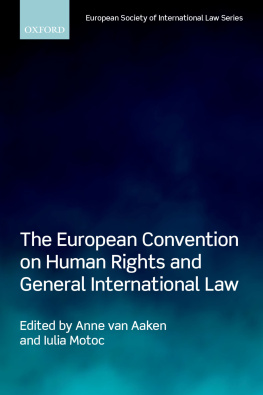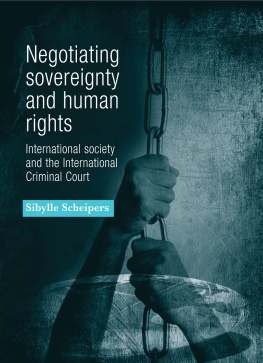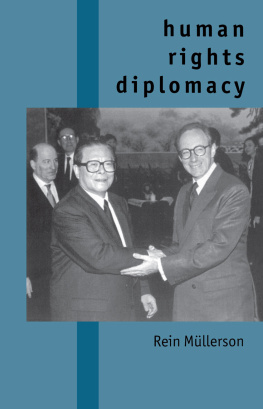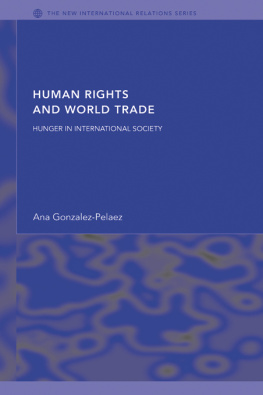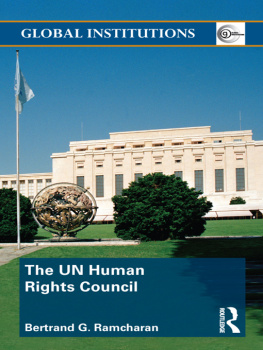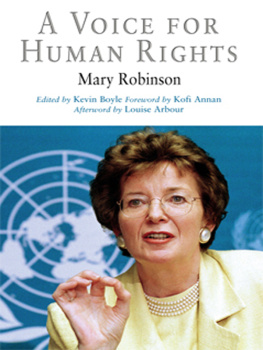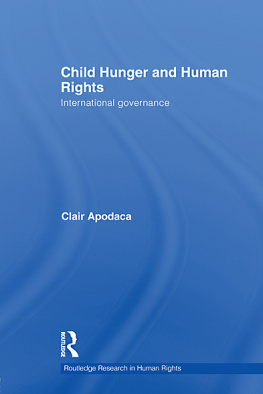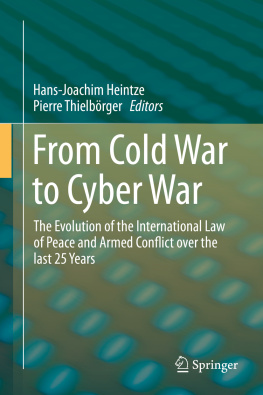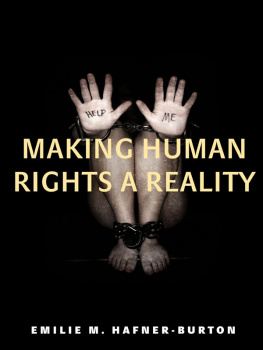Lauren - The evolution of international human rights: visions seen
Here you can read online Lauren - The evolution of international human rights: visions seen full text of the book (entire story) in english for free. Download pdf and epub, get meaning, cover and reviews about this ebook. City: Philadelphia, year: 2011, publisher: University of Pennsylvania Press, genre: Business. Description of the work, (preface) as well as reviews are available. Best literature library LitArk.com created for fans of good reading and offers a wide selection of genres:
Romance novel
Science fiction
Adventure
Detective
Science
History
Home and family
Prose
Art
Politics
Computer
Non-fiction
Religion
Business
Children
Humor
Choose a favorite category and find really read worthwhile books. Enjoy immersion in the world of imagination, feel the emotions of the characters or learn something new for yourself, make an fascinating discovery.

- Book:The evolution of international human rights: visions seen
- Author:
- Publisher:University of Pennsylvania Press
- Genre:
- Year:2011
- City:Philadelphia
- Rating:5 / 5
- Favourites:Add to favourites
- Your mark:
- 100
- 1
- 2
- 3
- 4
- 5
The evolution of international human rights: visions seen: summary, description and annotation
We offer to read an annotation, description, summary or preface (depends on what the author of the book "The evolution of international human rights: visions seen" wrote himself). If you haven't found the necessary information about the book — write in the comments, we will try to find it.
Lauren: author's other books
Who wrote The evolution of international human rights: visions seen? Find out the surname, the name of the author of the book and a list of all author's works by series.
The evolution of international human rights: visions seen — read online for free the complete book (whole text) full work
Below is the text of the book, divided by pages. System saving the place of the last page read, allows you to conveniently read the book "The evolution of international human rights: visions seen" online for free, without having to search again every time where you left off. Put a bookmark, and you can go to the page where you finished reading at any time.
Font size:
Interval:
Bookmark:
The Evolution of
International Human Rights
Third Edition
Pennsylvania Studies in Human Rights
Bert Lockwood, Jr., Series Editor
A complete list of books in the series is available from the publisher.
International Human Rights
Visions Seen
THIRD EDITION
Paul Gordon Lauren

Copyright 2011 University of Pennsylvania Press
All rights reserved. Except for brief quotations used for purposes of review or scholarly citation, none of this book may be reproduced in any form by any means without written permission from the publisher.
Published by
University of Pennsylvania Press
Philadelphia, Pennsylvania 19104-4012
www.upenn.edu/pennpress
Printed in the United States of America on acid-free paper
10 9 8 7 6 5 4 3 2 1
Library of Congress Cataloging-in-Publication Data
Lauren, Paul Gordon.
The evolution of international human rights : visions seen / Paul
Gordon Lauren.3rd ed.
p. cm. (Pennsylvania studies in human rights)
Includes bibliographical references and index.
ISBN 978-0-8122-2138-1 (hardcover : alk. paper)
1. Human rights. I. Title.
JC571.L285 2011 | |
323dc22 | 2010017606 |
to my teachers
One of the most enjoyable pleasures for any author is the opportunity that publication provides to acknowledge the generosity, assistance, and insights shared by others along the way. Many individuals and institutions in many places around the world contributed much to this book, and I am delighted to express my sincere appreciation to:
Herman Burgers, a rare individual of deep conviction and wide experience in the field of international human rights, for first challenging me to write this book and then graciously providing penetrating comments and helpful assistance along the way.
Bert Lockwood, Jr., the insightful, energetic, and creative editor of Human Rights Quarterly and the Pennsylvania Studies on Human Rights, for first inviting me to write this book and giving all the encouragement, support, and guidance that anyone could possibly want.
The archivists and staff of the United Nations Archives in New York and Geneva; Archives de la Socit des Nations et Collections Historiques, High Commissioner for Refugees, and Archives dtat in Geneva; U.S. National Archives and Manuscript Division of the Library of Congress in Washington, D.C.; British Public Record Office in London; National Archives of New Zealand in Wellington; Hoover Institution Archives at Stanford University; Franklin D. Roosevelt Library at Hyde Park; Ministre des Affaires trangres and Archives nationales in Paris; Politisches Archiv des Auswrtiges Amts in Bonn; Organization for Security and Cooperation in Europe (OSCE) in Prague; Rare Book and Manuscript Library of Columbia University and Leo Baeck Institute in New York; Council of Europe Archives in Strasbourg; and Diplomatic Record Office of the Japanese Ministry for Foreign Affairs in Tokyo for granting access to rare materials and archival collections.
The librarians at the Maureen and Mike Mansfield Library and the Law Library of the University of Montana, Bibliothque des Nations Unies at the Palais des Nations in Geneva, Green Library at Stanford University, Hoover Institution Library, Butler Library at Columbia University, Library of Congress, New York Public Library, Nobel Institute, Dag Hammarskjld Library at the United Nations, Suzzalo Library at the University of Washington, Alexander Turnbull Library, British Library, Bibliothque nationale, Yliopiston Kirjasto and Oikeustieteellisen Tiedekunnan Kirjasto of the University of Helsinki, Massey University Library, Bibliothque Publique et Universitaire de Genve, Library of the European Court of Human Rights, London School of Economics Library, University of Tokyo Library, Toyo University Library, Shanghai International Studies University Library, Columbus Memorial Library of the Organization of American States, and the Muse international de la Croix-Rouge et du Croissant-Rouge, for the use of resources and numerous courtesies.
The Rockefeller Foundation for an appointment as a Humanities Fellow, the Council for International Exchange of Scholars for an appointment as a Senior Fulbright Specialist and in cooperation with the U.S.-New Zealand Educational Foundation and the Fulbright Center of Finland for appointments as a Senior Fulbright Scholar, the Office of Research Administration and Department of History of the University of Montana, and the Tom and Ann Boone and John and Annie Hall endowments, for financial assistance.
Current and former staff members of the Office of the High Commissioner for Human Rights/Centre for Human Rights in Geneva, especially senior advisors Tom McCarthy and Zdzislaw Kedzia, Daniel Atchebro, Andrew Clapham, Fiona Blyth-Kubota, Jakob Moller, Bacre Waly Ndiaye, Anton Nikiforov, Laura Stryker-Cao, and Alfred De Zayas, for giving freely of their time to answer questions and provide invaluable insights about process and substance.
Those who graciously granted interviews, including Martti Ahtisaari, Colin Aikman, Carroll Bogert, Jimmy Carter, Frank Corner, Warren Hewitt, Jaakko Iloniemi, Clement John, the late Martin Luther King, Jr., Irne Kitsou-Milonas, Liu Binyan, J. M. Makatini, the late Mike Mansfield, Jan Mrtenson, Michael Pan, T. C. Ragachari, John Salzberg, Jerome Shestack, the late Clarence Streit, Yvonne Terlingen, Brian Urquart, Sandra Vogelgesang, and several who wish to remain anonymous, for sharing their vast experiences and perspectives on the world of international human rights.
Maurizio Cortiello, Sylvie Carlon-Riera, Anna Rey-Mermier, Jacques Oberson, and Maria del Mar Sanchez Moncho of Registry, Records, and Archives at the United Nations Office in Geneva; Marilla Guptil of the United Nations Archives in New York; Montserrat Canela Garayoa of the Records and Archives of the United Nations High Commissioner for Refugees; and Carol Davies, Salvatore Leggio, Nina Kriz Leneman, Gary Meixner, Pierre Pelou, Werner Simon, and Maggie Wachter of the Bibliothque des Nations Unies; and Yukiyoshi Asami and Kazuhiro Takahashi of the Diplomatic Record Office of the Japanese Ministry of Foreign Affairs, for assistance in finding documentary needles in haystacks.
Colleagues, friends, and commentators Tunde Adeleke, Reza Afshari, George Andreopoulos, David Aronofsky, Dan Caldwell, Ann Marie Clark, Richard Pierre Claude, the late Gordon A. Craig, Sally Cummings, Richard Drake, Asbjrn Eide, David Emmons, Mara Jos Falcn y Tella, Cees Flinterman, David Forsythe, Harry Fritz, the late Alexander George, Robert Greene, Forest Grieves, Kerry Howe, Anya Jabour, Mark Johnson, Darshan Kang, Jan Klabbers, Mehrdad Kia, Peter Koehn, Martti Koskenniemi, Ken Lockridge, James Lopach, J. Paul Martin, Leo Moser, Olatunde Ojo, Yunosuke Okura, Jody Pavilack, Ralph Pettman, Helge Pharo, Henry Sekyi, Tobin Shearer, Frederick Skinner, Anna-Lena Svensson-McCarthy, Ramesh Thakur, Howard Tolley, Richard Tuck, Nobuchika Urata, Philip Veerman, Hanne Hagtvedt Vik, Kyle Volk, Pamela Volkel, John R. Wallach, and Jay Winter, for sharing their expertise.
The Controller of Her Majestys Stationery Office, the Director and Chief Archivist of the National Archives of New Zealand, and the Director of the Rare Book and Manuscript Library of Columbia University for granting permission to cite materials in their respective collections; and to Patricia Koo Tsien for authorizing the use of papers from her father, Wellington Koo.
Next pageFont size:
Interval:
Bookmark:
Similar books «The evolution of international human rights: visions seen»
Look at similar books to The evolution of international human rights: visions seen. We have selected literature similar in name and meaning in the hope of providing readers with more options to find new, interesting, not yet read works.
Discussion, reviews of the book The evolution of international human rights: visions seen and just readers' own opinions. Leave your comments, write what you think about the work, its meaning or the main characters. Specify what exactly you liked and what you didn't like, and why you think so.



